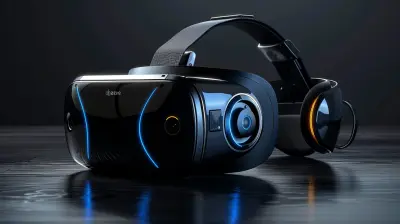How Wearables Could Evolve into Implantable Tech
28 July 2025
Wearable technology has revolutionized the way we track our health, communicate, and even interact with the world. From fitness trackers and smartwatches to AR glasses, wearables have become an essential part of our daily lives. But what if we could take it one step further? What if instead of wearing technology, we implanted it directly into our bodies?
It might sound like something out of a sci-fi movie, but the reality is that implantable technology is closer than you think. Let's break down the potential future of wearables and how they could evolve into fully integrated implantable tech.

The Rise of Wearable Technology
Before we jump into the future, let's take a quick look at how far wearables have come. Just a decade ago, smartwatches and fitness trackers were in their infancy. Today, they can monitor heart rate, track oxygen levels, analyze sleep, and even detect early signs of illness.Wearables have also found their way into different industries. Athletes use them to optimize performance, doctors use them for remote patient monitoring, and even businesses integrate wearables for productivity tracking. But while they offer convenience, they still have limitations—battery life, bulkiness, and reliance on external devices.
The Next Step: Implantable Technology
Wearables provide a ton of benefits, but implantable technology could take it much further. Imagine a world where your health data is seamlessly monitored and stored inside your body. No need for a smartwatch or a fitness band—everything would be integrated under your skin.This shift could redefine healthcare, communication, and personal convenience, offering a more natural and efficient way to interact with technology.

How Implantable Tech Could Change Our Lives
Now, let's get into the exciting part: how implantable technology could revolutionize different aspects of our lives.1. Health Monitoring Like Never Before
One of the biggest advantages of implantable tech would be health monitoring. Wearables can only do so much—you still need to charge them, wear them consistently, and sync them with your phone. But implants? They could provide real-time health tracking 24/7 without any effort on your part.Potential Benefits:
- Continuous Glucose Monitoring: Diabetics could have real-time glucose tracking without the need for wearable sensors.- Heart & Blood Pressure Monitoring: Early detection of heart disease or strokes could save countless lives.
- Disease Prediction & Prevention: AI-powered implants could flag potential health risks before symptoms even appear.
Doctors could spot trends in your health data and provide proactive treatments instead of reactive care. This could potentially extend lifespans and improve quality of life dramatically.
2. Seamless Communication & Connectivity
We've already seen how smartwatches and wireless earbuds improve communication. But what if you could answer calls, send texts, or even access the internet without a physical device?Brain-computer interfaces (BCIs) are already under development, and they might allow us to interact with technology using just our thoughts. Imagine effortlessly sending an email, controlling your smart home, or even browsing social media—all through an implant in your brain.
Possibilities Include:
- No More Screens: Direct neural interfaces could replace smartphones and screens.- Instant Translations: Language barriers could become a thing of the past with real-time translation implants.
- Telepathic Communication: Sending messages via thought instead of typing or speaking? It could happen!
3. Enhanced Security & Personal Identification
Passwords, keys, and ID cards could soon be obsolete. Implantable microchips could provide foolproof authentication for everything from unlocking your car to accessing your bank account.- Biometric Security: Your body itself could be the ultimate password.
- Financial Transactions: Paying for goods with a simple hand wave could become standard.
- Travel & Access Control: Seamless, secure travel without passports or boarding passes.
Imagine walking into your home and your lights adjust automatically, your favorite music plays, and the perfect temperature is set—all because your implant recognizes you.
4. Augmented Human Abilities
We’ve seen advancements in prosthetics and bionic limbs, but implantable tech could push human capabilities even further.- Enhanced Vision: Retinal implants could provide night vision or zoom capabilities.
- Superhuman Hearing: Cochlear implants already assist the deaf, but future implants could enhance hearing beyond normal human limits.
- Cognitive Enhancement: Memory implants or brain augmentation could potentially increase intelligence, focus, and even creativity.
Would we be entering an era of "superhumans"? Maybe, but the ethical and societal implications are just as fascinating as the technology itself.

The Challenges & Ethical Concerns
As exciting as all of this sounds, there are also some serious challenges to consider.1. Privacy & Security Risks
With technology inside our bodies, how do we ensure that our data is safe? Could hackers gain access to our implants? Cybersecurity would need to evolve alongside implantable tech to prevent breaches.2. Ethical Dilemmas
Would this technology only be available to the wealthy? Could it create a divide between those who can afford enhancements and those who cannot? The ethical and social consequences of human augmentation would need careful consideration.3. Health Risks & Implant Rejections
Our bodies are not designed to host electronics. Scientists would need to ensure that implants are biocompatible and safe over long periods. Rejection, infections, or long-term side effects could be potential risks.4. The Loss of Human Autonomy
If brain implants allowed constant monitoring or even influence over thoughts and decisions, where do we draw the line? Governments and corporations could potentially misuse such technology.
How Far Are We from This Future?
Believe it or not, we're not that far away. Companies like Neuralink and Synchron are already developing brain-computer interfaces, and biohacking communities are experimenting with DIY implants. Smart tattoos, RFID chips, and even subdermal LED displays are early glimpses into this future.However, widespread adoption will take time. Regulations, safety testing, and public acceptance will all play major roles in how quickly implantable tech becomes mainstream.
Final Thoughts
The transition from wearables to implantable technology is inevitable—it’s just a matter of when, not if. While the benefits are groundbreaking, the risks and ethical concerns cannot be ignored.Would you be willing to get an implant if it meant better health, seamless connectivity, and enhanced abilities? Or would you rather stick to your smartwatch and earbuds?
The future of technology is quite literally beneath our skin, and it’s a future we’ll all need to prepare for.
all images in this post were generated using AI tools
Category:
Future TechAuthor:

John Peterson
Discussion
rate this article
1 comments
Tia McElveen
This article raises intriguing points about the transition from wearables to implantable tech. While the potential for enhanced health monitoring is exciting, we must also consider the ethical implications and privacy concerns that come with integrating technology directly into our bodies.
August 5, 2025 at 2:30 AM

John Peterson
Thank you for your thoughtful comment! I completely agree that while the advancements in implantable tech offer exciting possibilities for health monitoring, we must prioritize ethical considerations and privacy concerns as we move forward.


